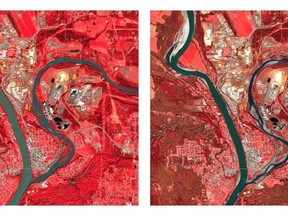Dave Campbell says persistent drought conditions in British Columbia date back to 2022, so the province is heading into this summer with “multi-year” precipitation deficits.

Article content
Parts of British Columbia are likely to enter “uncharted territory” with drought if they see another hot, dry summer, says the director of the province’s River Forecast Centre.
Dave Campbell says persistent drought conditions in British Columbia date back to 2022, so the province is heading into this summer with “multi-year” precipitation deficits.
Article content
Satellite photos show rivers across the province are narrower and shallower than at the same time in 2023, which happened to be one of the driest years on record in British Columbia.
Advertisement 2
Article content
With average snowpack levels lower than those recorded in British Columbia last winter, Campbell says he expects cumulative effects that could include water shortages and other challenges.
“We know that the background conditions we face this year are much more challenging than what we started last year,” he said in a recent interview.
“The concern is obviously whether we have that long, hot, dry (period) that we have seen last year and also the year before. “If this continues this summer, then we are really on the path to things we haven’t seen in recent memory.”
The Interior pockets are especially dry. Campbell said he is most concerned about the effects of the drought on smaller rivers and streams in the central interior.
“Prince George, Quesnel, Williams Lake, Vanderhoof, that’s the hotspot, and then the other (area) that would be concerning would be in the northeast,” he said.
The area around Vanderhoof, west of Prince George, has seen about 220 millimeters of rain over the past year, when it normally falls about 460 millimeters, he said.
Images provided by the Canadian Space Agency appear to show the effects of the persistent drought in the Interior compared to those taken last spring.
Article content
Advertisement 3
Article content
An image taken last week by the European Space Agency’s Sentinel-2 satellite shows the Quesnel River is narrower, with more banks exposed this month compared to an image taken a year ago. Last week’s photograph shows patches of exposed riverbed and sandbars, indicating lower water levels in the tributary as it meets the upper Fraser River at Quesnel.
Satellite images tell a similar story at Fort St. James, where the water appears shallower this year as Lake Stuart flows into the Stuart River.
The Fort Nelson and Muskwa rivers also appear narrower, with more banks exposed compared to images taken in April 2023.
The Canadian Space Agency notes that the images use infrared “false colours” because they show the boundaries between land and water more clearly than other representations.
Campbell said parts of British Columbia’s Okanagan will also likely see the effects of the moisture deficit and low amounts of snow that melted earlier this spring.
Meanwhile, on northern Vancouver Island, he said, the Port Hardy community has seen 1,260 millimeters of rain over the past year, when it normally receives a little more than 1,800 millimeters.
Advertisement 4
Article content
“A few months of wet season rain” would be needed to alleviate the drought, he said.
BC’s snow study last month found snowpack across the province was “extremely low,” averaging 63 per cent of normal. The Quesnel area was listed at 52 percent of normal, while the neighboring West-Road Chilcotin region was at zero percent.
Officials are expected to hold a news conference on the drought and wildfires on Thursday when the province releases its latest snowpack bulletin.
Recommended by Editorial
-

Community mourns loss of thousands of fish as BC drought risk resurfaces
-

British Columbia’s April snowpack is lowest on record
Bookmark our website and support our journalism: Don’t miss the news you need to know – add VancouverSun.com and LaProvincia.com to your favorites and subscribe to our newsletters here.
You can also support our journalism by becoming a digital subscriber: for just $14 a month, you can get unlimited access to The Vancouver Sun, The Province, National Post and 13 other Canadian news sites. Support us by subscribing today: The Vancouver Sun | The province.
Article content



